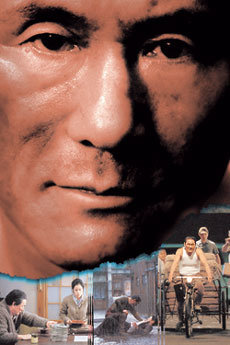He Was a Blood-red Male

Kim Joon-pyeong, played by Kitano Takeshi, moves to Osaka, Japan from Jeju Island in 1923 and built his own kingdom through violence and violence alone. He rapes his wife Lee Young-hee (Suzuki Kyoka) constantly and reigns over his children through violence. Kim exploits his employees at his fishcake factory to rake in fortunes while ceaselessly coveting women. This new movie by the Korean-Japanese director Choi Yang-il, Blood and Bones which opens on February 25, is more like a chilly documentary about a beast rather than a theatrical movie. This movie, which is based on a novel by Korean-Japanese writer Yang Seok-il, merely observes Kim Joon-pyeongs animal-like survival methods, only living for violence and reproduction. Kim Joon-pyeong is not immoral. He is like a multi-cellular creature with no concept of morality at all.
This movie sends chills down your spine as it is arid. The showdown between Kim and his son Takeshi in the rain depicts a young beast engaged in a bloody contest with the leader of the pack over meat and females. The son throws a punch first at his father with a burst of profanity, and the father crushes the boys face into the mud. In the end, the order between the father and the son is kept only because the father won over his son through oppression. The realization of this leaves audiences sad and fearful. Underneath the guise of being a human, that was the truth behind the relationships.
Another son, Masao, hates his father and at the same time, takes after him. The daughter, who got married just to get away from her fathers violence, is again victimized by the violence of her husband, another male. His children, who feared having his bad blood in them, are unable to rid themselves of their fathers accursed DNA. That is the true nature of the fate that is inscribed into the blood and bones of ones self.
Terse lines of Kim Joon-pyeong add to the horror. He uses only those words indispensable in his jungle where only the fittest survives and receives food, excretion, rest, and reproduction. The first word he throws at his wife is kimchi!, and the only word he uses in front of a woman is strip! Unlike children who constantly address him as father, he never calls them son, daughter, or their names. He only strikes them and demands, What am I to you? What are you to me? These do not come exactly as a question, but as a bestial oath to himself that he will forever live not as a father but as a male.
As it is deduced from the movies straightforward title, Blood and Bones, this movie is not at all cinematic. The movie does not seem to care for any formal or artistic accomplishments. For the two hours and 22 minutes of the film, it just lets Kim Joon-pyeong be rather than showing him. In such callousness behind the pretext of irresponsibility, Kim Joon-pyeongs murderous spirit rips out of the screen to disturb the audience. The movie creates a strong driving force through such methods.
Kitano Takeshi is still expressionless. However, the character he depicts in this movie differs from his existing characters that had something strongly compressed inside. Whenever he feels the need, he would attack, kill, eat, and have sex. There is nothing compressed inside Kim Joon-pyeong. That makes this movie frightening. Humans are frightening. Rated for 18 and older.
Seung-Jae Lee sjda@donga.com







